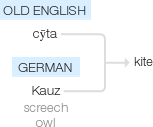Kite
Old English cȳta (in kite (sense 2 of the noun)); probably of imitative origin and related to German Kauz ‘screech owl’. The toy was so named because it hovers in the air like the bird.
wiktionary
The noun is from Middle English kyte, kīte, kete(“a kite endemic to Europe, especially the red kite (Milvus milvus)”), from Old English cȳta(“kite; bittern”), [1] [2] from Proto-Germanic *kūtijô, diminutive of *kūts(“bird of prey”), from Proto-Indo-European *gū-(“to cry, screech”). The English word is cognate with Scots kyt, kyte(“kite; bird of prey”), Middle High German kiuzelīn, kützlīn(“owling”) (modern German Kauz(“barn owl; screech owl”)).
Sense 3 (“lightweight toy”) is from the fact that it hovers in the air like the bird. [2]
The verb is derived from the noun. [3]
Origin uncertain; possibly:
Borrowed from Coptic ⲕⲓⲧⲉ(kite), from Demotic qt, from Egyptian qdt.
etymonline
kite (n.)
European bird of prey, inferior hawk (Milvus ictinus, but applied elsewhere to similar birds), Old English cyta, probably imitative of its cry (compare ciegan "to call," German Kauz "screech owl"). Of persons who prey on others, 1550s.
The toy kite, a light frame covered with paper or cloth, is first so-called 1660s, from its way of hovering in the air like a bird. The dismissive invitation to go fly a kite is attested by 1942, American English, probably tracing to the popular song of the same name (lyrics by Johnny Burke), sung by Bing Crosby in "The Star Maker" (1939):
Go fly a kite and tie your troubles to the tail
They'll be blown away by a merry gale,
Go fly a kite and toss your worries to the wind
And they won't come back, they'll be too chagrined.
kite (v.)
in reference to writing a fictitious check, 1839, American English, from 1805 phrase fly a kite "raise money by issuing commercial paper on nonexistent funds;" see kite (n.). Related: Kited; kiting.
